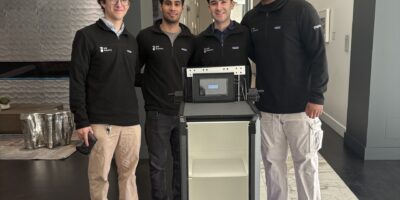On June 4th, the Globe and Mail unveiled the recipients of the 15th annual Top 40 Under 40 award. This award event, organized by the executive search firm, The Caldwell Partners International, honors leaders and groundbreakers in all fields from business, to science, to aviation, and everything in between. An initial list of 1,200 to 1,400 nominations from across Canada is narrowed down to a short list of 100, which is then narrowed down to the iconic final forty by a panel of 25 business and community leaders. The panel bases their decision on five criteria: vision and leadership, innovation and achievement, impact, growth/ development strategy and community involvement. This already daunting award is made all the more impressive by the fact all of its recipients have made all of their accomplishments before reaching the iconic mark of forty years of age. This year, amongst the CEO’s, Doctors, and big world Bankers is a slightly more familiar name: University of Waterloo’s very own Leonardo Simon.
I had an opportunity to sit down with Dr. Simon and learn a little more about his work. Hailing from the state of Rio Grande Do Sul in Brazil where he completed his undergrad as well as Masters and PhD, Simon currently works in the Department of Chemical Engineering conducting research in materials, more specifically plastics. His lab work consists of taking various liquids and gases and turning them into solids using autoclave reactors, and then analyzing the resulting products for it’s various properties to help understand both the resulting product and the processes used to make it. By having this high level of understanding of the process that goes into manufacturing plastics, the resulting material can be altered and constructed at a nano-particle level to achieve the desired results, be it resistance to heat, strength, or whichever property is desired for the plastic’s intended use. Simon is also currently looking into using renewable resources as the feed reactants for the plastic manufacturing process, which is the beginning of the work he is currently being praised for.
In 2006, work began on a large-scale automotive research project that would begin to change the way industry thinks about what to put into their vehicles. Through collaboration with the University of Guelph, what was soon to become the feedstock for this process was discovered. Farmers were looking to find better value for their crops, particularly wheat and soy. Only about 30% percent of a crop of wheat is harvested and turned into either food and sold commercially, or feed for farm animals. The same applies for only 50% of a typical soybean crop. The remaining portion of the crop is left on the field as waste, and local farmers had approached researchers at Guelph in hopes of finding a more profitable use for the waste. Simultaneously, the automotive industry was looking to the research community for help. Manufacturers were looking for lightweight, renewable materials to be used in vehicles to help reduce dependency on foreign oil, as well as reduce the impact on the environment by using more environmentally-friendly products that grow every year. These needs combined to create the BioCar project, an initiative funded by the Ontario Research Fund that officially started in 2008. This project combines efforts of researchers from the Universities of Waterloo and Guelph as well as the University of Toronto and Windsor who hope to bridge the gap between the automotive industry and farmers. There are many individual projects that make up the BioCar Project, but Simon’s is the first to go commercial.
Simon’s contribution to the BioCar Project combined his expertise in material science with the vast availability of feed material from the farmer’s crop waste. Simon has taken this crop waste, such as wheatstraw and similar material, and used it to manufacture a lightweight polypropylene plastic that can be used in injection molding. Using this eco-friendly renewable material removes the need for heavier chemicals such as calcium carbonate. This achievement is the first of it’s kind in the world, and is truly remarkable, since injection-molding plastic can be used to make truly anything; coffee mugs, plastic chairs, electronics, the list goes on and on. Where Simon has found his niche for this technology is in the automotive sector, since injection molded polypropylene is used in extremely large quantities to make many components that go into vehicles such as storage bins, bumpers, and many interior shell components.
A project like this didn’t go unnoticed for long, after being shown the potential for this technology, automotive giant Ford picked up the technology, and announced in November 2009 that they would be using Simon’s material in components of their 2010 Flex model. The storage bins in the third row of the vehicle will be made with the wheatstraw material, but plans for expansion to include more interior and even motor components are currently in the works. The benefits of this project are further magnified as the extensive process required to produce a vehicle suddenly becomes much more local. “The very nice thing today is that wheatstraw is grown in Ontario, it’s processed in Ontario initially, it crosses the border to be manufactured into a part, it returns back to Ontario, and the vehicle is assembled in Oakville,” Simon explains. Part of the environmental damage caused m manufacturing is a result of the transportation of materials to and from various manufacturing locations that are extremely far form one another. The process utilizing wheatstraw reduces this dramatically.
The focus of the project isn’t just the potential environmental benefits. When asked if this project was another indication of the ‘greener’ direction of the field of material science, Simon explains the slightly different angle. “I think the key word is sustainability. We want to be economically sustainable, we want it to be socially sustainable, where the people doing the job have a good quality of living, and the environment should be sustainable as well.” The scope of the project focuses on every person it affects, from the farmers all the way through to the vehicle owners, and not one group on the way is ignored.
When asked about his achievements, Simon is exceptionally humble and aware of the efforts of others that made this all possible. “I attribute our success to teamwork and talent,” he explains, “Talent of our graduate students, talent of our co-op students that worked throughout this project, and talent of our industrial members that are supporting this project. We all worked together towards one end, and the thing became commercial.” Simon is also currently sharing this opportunity with undergrad students, as a few years ago he created the Waterloo Team for Sustainable Automotive Materials. Members of this team develop car parts using renewable materials, and collaborate with the Alternative Fuels Team (UWAFT) to compete in the EcoCar Challenge.
This project can only grow from here; commercial vendors are now knocking at Simon’s door to get their hands on this revolutionary material. The unique aspect of this project is that its commercial scope knows no bounds. It can be applied in literally every industry, and the material can be created almost everywhere. Simon explains, “It can reach any market, that’s the advantage. If you have bad weather one year, say droughts or floods in North America, Asia will likely have plenty of this material available. Much like food.” A dependency on this technology at this point seems to be anything but risky. The only current shortcoming seems to be that the technology will not expand as rapidly as it potentially could, since most manufacturers still need to keep peace with the big oil companies from which they’ve been receiving petroleum-based materials for years. This isn’t stopping Simon however, he plans to use this to his advantage, “We’re looking to have a hybrid; integrating petroleum, mining and agriculture as equal suppliers of materials.” It’s a true milestone in the strive to make both materials and the automotive industry a little ore eco-friendly, another big push in the environmental effort that will have global effects that started right here in Waterloo.
If you are interested in finding out more about the Waterloo Team for Sustainable Automotive Materials, visit www.autobiomobile.uwaterloo.ca




bmw cars
wow this is so nice that a Green Plastics Win Waterloo Professor National Award and i am so happy that you share this information to all…..